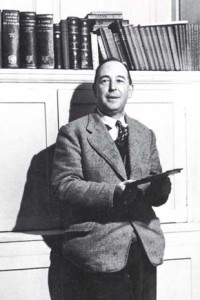 C. S. Lewis’s ruminations on the need for learning, even during times of war or other periods of great stress, in his “Learning in War-Time” essay, are so fulsome that it requires more than one post to cover his key points. This installment focuses on the life of the scholar, so it has special meaning to me.
C. S. Lewis’s ruminations on the need for learning, even during times of war or other periods of great stress, in his “Learning in War-Time” essay, are so fulsome that it requires more than one post to cover his key points. This installment focuses on the life of the scholar, so it has special meaning to me.
“The intellectual life,” Lewis explains, “is not the only road to God, nor the safest, but we find it to be a road, and it may be the appointed road for us.” He then points out the greatest danger on this road:
Of course, it will be so only so long as we keep the impulse pure and disinterested. That is the great difficulty. As the author of the Theologia Germanica says, we may come to love knowledge—our knowing—more than the thing known: to delight not in the exercise of our talents but in the fact that they are ours, or even in the reputation they bring us.
Let me interject here that I realize this danger clearly in my own life. It’s so easy to write something and hope that it will get published and solidify one’s reputation as a scholar “with something important to say.” I have to go back to the Lord continually to keep my heart right on this point. Sometimes, when we achieve our goals, we are at the height of the danger. As Lewis notes,
Every success in the scholar’s life increases this danger. If it becomes irresistible, he must give up his scholarly work. The time for plucking out the right eye has arrived.
Yet we are not to allow the threat to keep us from pursuing God’s call on our life, as long as we keep our hearts right before Him. And God does want His people in this field, able to answer challenges and help direct the thoughts of others:
To be ignorant and simple now—not to be able to meet the enemies on their own ground—would be to throw down our weapons, and to betray our uneducated brethren who have, under God, no defence but us against the intellectual attacks of the heathen.
Then comes the phrasing I have seen others refer to most often in this essay:
Good philosophy must exist, if for no other reason, because bad philosophy needs to be answered.
As a historian, I appreciate, in particular, his next few thoughts:
Most of all, perhaps, we need intimate knowledge of the past. Not that the past has any magic about it, but because we cannot study the future, and yet need something to set against the present, to remind us that the basic assumptions have been quite different in different periods and that much which seems certain to the uneducated is merely temporary fashion.
Probably the second-most quoted portion of this essay comes next:
A man who has lived in many places is not likely to be deceived by the local errors of his native village; the scholar has lived in many times and is therefore in some degree immune from the great cataract of nonsense that pours from the press and the microphone of his own age.
Shall we now add “the Facebook postings and Twitter tweets” of this newest age?
Yes, we need a sense of history to see the full context of the drama playing out in our day. Thanks to Lewis, we have that reminder today.
